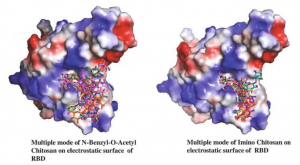A group from Birla Institute of Technology and Sciences (BITS), Rajasthan, India, etc. has reported Chitosan derivatives could be novel inhibitors against wild type and variants of SARS-CoV-2 virus infection.
https://www.ncbi.nlm.nih.gov/pmc/articles/PMC8313795/
A library of chitosan derivatives was screened by site-specific docking at not only spike protein Receptor Binding Domain (RBD) of wild type SARS-CoV-2 but also on RBD of Alpha and Gamma SARS-CoV-2 variants. The obtained result was very interesting and ranks N-benzyl-O-acetyl-chitosan, Imino-chitosan, as a potent antiviral candidate due to its high binding affinity of the ligands (-6.4 to -6.7 kcal/mol) with SARS-CoV-2 spike protein RBD
Conformation models for both ligands in electrostatic surface are shown below,

A family of microsomal enzymes known as cytochrome P450 (CYP450) is responsible for xenobiotic metabolism. CYP3A4, CYP3A2, CYP2C9, CYP2C19, and CYP2D6 are all members of the CYP450 family, which are involved in metabolizing various drugs. The ideal scenario of a drug should be the non-inhibition of these enzymes. In this regard, findings of the test ligands suggested both Imino-chitosan and N-benzyl-o-acetyl-chitosan be the decent leads.
The toxicity profile of Imino-chitosan and N-benzyl-o-acetyl-chitosan was determined on the basis of their mutagenic and carcinogenic properties, using the in silico Ames test, carcinogenicity test in rats and mice, and HERG inhibition results. All the results of the toxicity profile were favorable indicating that the ligands can be potential drugs.
